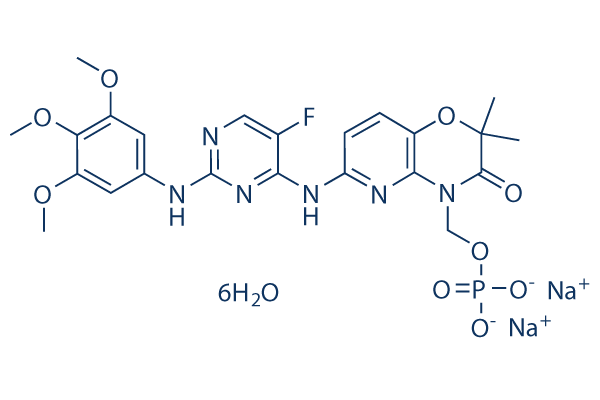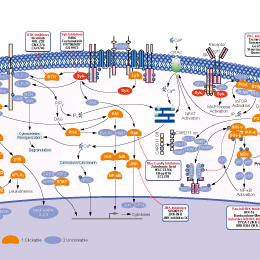
- Bioactive Compounds
- By Signaling Pathways
- PI3K/Akt/mTOR
- Epigenetics
- Methylation
- Immunology & Inflammation
- Protein Tyrosine Kinase
- Angiogenesis
- Apoptosis
- Autophagy
- ER stress & UPR
- JAK/STAT
- MAPK
- Cytoskeletal Signaling
- Cell Cycle
- TGF-beta/Smad
- DNA Damage/DNA Repair
- Compound Libraries
- Popular Compound Libraries
- Customize Library
- Clinical and FDA-approved Related
- Bioactive Compound Libraries
- Inhibitor Related
- Natural Product Related
- Metabolism Related
- Cell Death Related
- By Signaling Pathway
- By Disease
- Anti-infection and Antiviral Related
- Neuronal and Immunology Related
- Fragment and Covalent Related
- FDA-approved Drug Library
- FDA-approved & Passed Phase I Drug Library
- Preclinical/Clinical Compound Library
- Bioactive Compound Library-I
- Bioactive Compound Library-Ⅱ
- Kinase Inhibitor Library
- Express-Pick Library
- Natural Product Library
- Human Endogenous Metabolite Compound Library
- Alkaloid Compound LibraryNew
- Angiogenesis Related compound Library
- Anti-Aging Compound Library
- Anti-alzheimer Disease Compound Library
- Antibiotics compound Library
- Anti-cancer Compound Library
- Anti-cancer Compound Library-Ⅱ
- Anti-cancer Metabolism Compound Library
- Anti-Cardiovascular Disease Compound Library
- Anti-diabetic Compound Library
- Anti-infection Compound Library
- Antioxidant Compound Library
- Anti-parasitic Compound Library
- Antiviral Compound Library
- Apoptosis Compound Library
- Autophagy Compound Library
- Calcium Channel Blocker LibraryNew
- Cambridge Cancer Compound Library
- Carbohydrate Metabolism Compound LibraryNew
- Cell Cycle compound library
- CNS-Penetrant Compound Library
- Covalent Inhibitor Library
- Cytokine Inhibitor LibraryNew
- Cytoskeletal Signaling Pathway Compound Library
- DNA Damage/DNA Repair compound Library
- Drug-like Compound Library
- Endoplasmic Reticulum Stress Compound Library
- Epigenetics Compound Library
- Exosome Secretion Related Compound LibraryNew
- FDA-approved Anticancer Drug LibraryNew
- Ferroptosis Compound Library
- Flavonoid Compound Library
- Fragment Library
- Glutamine Metabolism Compound Library
- Glycolysis Compound Library
- GPCR Compound Library
- Gut Microbial Metabolite Library
- HIF-1 Signaling Pathway Compound Library
- Highly Selective Inhibitor Library
- Histone modification compound library
- HTS Library for Drug Discovery
- Human Hormone Related Compound LibraryNew
- Human Transcription Factor Compound LibraryNew
- Immunology/Inflammation Compound Library
- Inhibitor Library
- Ion Channel Ligand Library
- JAK/STAT compound library
- Lipid Metabolism Compound LibraryNew
- Macrocyclic Compound Library
- MAPK Inhibitor Library
- Medicine Food Homology Compound Library
- Metabolism Compound Library
- Methylation Compound Library
- Mouse Metabolite Compound LibraryNew
- Natural Organic Compound Library
- Neuronal Signaling Compound Library
- NF-κB Signaling Compound Library
- Nucleoside Analogue Library
- Obesity Compound Library
- Oxidative Stress Compound LibraryNew
- Plant Extract Library
- Phenotypic Screening Library
- PI3K/Akt Inhibitor Library
- Protease Inhibitor Library
- Protein-protein Interaction Inhibitor Library
- Pyroptosis Compound Library
- Small Molecule Immuno-Oncology Compound Library
- Mitochondria-Targeted Compound LibraryNew
- Stem Cell Differentiation Compound LibraryNew
- Stem Cell Signaling Compound Library
- Natural Phenol Compound LibraryNew
- Natural Terpenoid Compound LibraryNew
- TGF-beta/Smad compound library
- Traditional Chinese Medicine Library
- Tyrosine Kinase Inhibitor Library
- Ubiquitination Compound Library
-
Cherry Picking
You can personalize your library with chemicals from within Selleck's inventory. Build the right library for your research endeavors by choosing from compounds in all of our available libraries.
Please contact us at [email protected] to customize your library.
You could select:
- Antibodies
- Bioreagents
- qPCR
- 2x SYBR Green qPCR Master Mix
- 2x SYBR Green qPCR Master Mix(Low ROX)
- 2x SYBR Green qPCR Master Mix(High ROX)
- Protein Assay
- Protein A/G Magnetic Beads for IP
- Anti-Flag magnetic beads
- Anti-Flag Affinity Gel
- Anti-Myc magnetic beads
- Anti-HA magnetic beads
- Magnetic Separator
- Poly DYKDDDDK Tag Peptide lyophilized powder
- Protease Inhibitor Cocktail
- Protease Inhibitor Cocktail (EDTA-Free, 100X in DMSO)
- Phosphatase Inhibitor Cocktail (2 Tubes, 100X)
- Cell Biology
- Cell Counting Kit-8 (CCK-8)
- Animal Experiment
- Mouse Direct PCR Kit (For Genotyping)
- New Products
- Contact Us
Fostamatinib disodium hexahydrate
Synonyms: Tavalisse, R788 disodium hexahydrate, Tamatinib Fosdium hexahydrate
Fostamatinib (R788) disodium (Tamatinib Fosdium) hexahydrate, a prodrug of the active metabolite R406, is a Syk inhibitor with IC50 of 41 nM in a cell-free assay.

Fostamatinib disodium hexahydrate Chemical Structure
CAS No. 914295-16-2
Purity & Quality Control
Batch:
S494401
DMSO]100 mg/mL]false]Water]Insoluble]false]Ethanol]Insoluble]false
Purity:
99.8%
99.8
Fostamatinib disodium hexahydrate Related Products
| Related Targets | ZAP70 | Click to Expand |
|---|---|---|
| Related Products | R406 R406 (free base) PRT062607 (P505-15) HCl Entospletinib (GS-9973) Piceatannol BAY-61-3606 PRT-060318 2HCl TAK-659 Hydrochloride RO9021 | Click to Expand |
| Related Compound Libraries | Tyrosine Kinase Inhibitor Library PI3K/Akt Inhibitor Library Angiogenesis Related compound Library HIF-1 Signaling Pathway Compound Library FDA-approved Anticancer Drug Library | Click to Expand |
Signaling Pathway
Biological Activity
| Description | Fostamatinib (R788) disodium (Tamatinib Fosdium) hexahydrate, a prodrug of the active metabolite R406, is a Syk inhibitor with IC50 of 41 nM in a cell-free assay. | ||
|---|---|---|---|
| Targets |
|
| In vitro | ||||
| In vitro | R788 is a prodrug of the spleen tyrosine kinase (Syk) inhibitor R406. R788 is a competitive inhibitor for ATP binding with a Ki of 30 nM. R788 dose-dependently inhibits anti-IgE-mediated CHMC degranulation with an EC50 of 56 nM. R788 also inhibits the anti-IgE-induced production and release of LTC4 and cytokines and chemokines, including TNFα, IL-8, and GM-CSF. Inhibition of Syk by R788 results in inhibition of all phosphorylation events downstream of Syk signaling. Next to FcϵRI signaling in CHMC, R788 most potently inhibits the signaling of IL-4 and IL-2 receptors. R788 specifically inhibits FcγR signaling in human mast cells, macrophages, and neutrophils. R788 can inhibit local inflammatory injury mediated by immune complexes.[1] R788 induces apoptosis of the majority of examined DLBCL cell lines. In R788-sensitive DLBCL cell lines, R788 specifically inhibits both tonic- and ligand-induced BCR signaling (autophosphorylation of SYK525/526 and SYK-dependent phosphorylation of the B-cell linker protein [BLNK]).[2] |
|||
|---|---|---|---|---|
| Kinase Assay | Fluorescence polarization kinase assay and Ki determination | |||
| The fluorescence polarization reactions are performed. For Ki determination, duplicate 200-μL reactions are set up at eight different ATP concentrations from 200 μM (2-fold serial dilutions) in the presence of either DMSO or R788 at 125, 62.5, 31.25, 15.5, or 7.8 nM. At different time points, 20 μL of each reaction is removed and quenched to stop the reaction. For each concentration of R788, the rate of reaction at each concentration of ATP is determined and plotted against the ATP concentration to determine the apparent Km and Vmax. Finally the apparent Km (or apparent Ki/Vmax) is plotted against the inhibitor concentration to determine the Ki. | ||||
| Cell Research | Cell lines | Cultured human mast cells (CHMC) | ||
| Concentrations | 0-100 μM | |||
| Incubation Time | 0.5 h | |||
| Method | Cultured human mast cells (CHMC) are derived from cord blood CD34+ progenitor cells and grown, primed, and stimulated and shown in supplemental data. Before stimulation, cells are incubated with R788 or DMSO for 30 minutes. Cells are then stimulated with either 0.25 to 2 mg/mL anti-IgE or anti-IgG or 2 μM ionomycin. For tryptase measurement, ~1500 cells per well are stimulated for 30 min in modified Tyrode's buffer. For LTC4 and cytokine production, 100,000 cells per well are stimulated for 1 or 7 hours, respectively. Tryptase activity is measured by luminescence readout of a peptide substrate, and LTC4 and cytokines are measured using Luminex multiplex technology. |
|||
| In Vivo | ||
| In vivo | Oral administration of R788 to mice reduces immune complex-mediated inflammation in a reverse-passive Arthus reaction and two antibody-induced arthritis models.[1] In another study, R788 effectively inhibits BCR signaling in vivo, resulting in reduced proliferation and survival of the malignant B cells and significantly prolongs survival of the treated animals.[3] R788 demonstrates a significant reduction in major inflammatory mediators such as TNFalpha, IL-1, IL-6 and IL-18, leading to reduced inflammation and bone degradation in models of rheumatoid arthritis.[4] |
|
|---|---|---|
| Animal Research | Animal Models | Balb/c mice with arthritis |
| Dosages | 1 mg/kg or 5 mg/kg | |
| Administration | o.g. | |
| NCT Number | Recruitment | Conditions | Sponsor/Collaborators | Start Date | Phases |
|---|---|---|---|---|---|
| NCT05904093 | Not yet recruiting | Sickle Cell Disease|Hb-SS Disease|Hemoglobin S|Disease Sickle Cell Anemia|Sickle Cell Disorders|Hemoglobin Beta Thalassemia Disease |
National Heart Lung and Blood Institute (NHLBI)|National Institutes of Health Clinical Center (CC) |
May 15 2024 | Phase 1 |
| NCT05509582 | Enrolling by invitation | Immune Mediated Anemia|Immune Mediated Thrombocytopenia|Chronic GVHD |
National Heart Lung and Blood Institute (NHLBI)|National Institutes of Health Clinical Center (CC) |
May 15 2024 | Phase 2 |
| NCT06071520 | Completed | Primary Immune Thrombocytopenia |
Fundación Pública Andaluza para la gestión de la Investigación en Sevilla |
March 1 2023 | -- |
| NCT05613296 | Not yet recruiting | ITP - Immune Thrombocytopenia|Chronic ITP|Refractory ITP |
Gruppo Italiano Malattie EMatologiche dell''Adulto |
February 2023 | -- |
| NCT04543279 | Terminated | Myelofibrosis|Thrombocytopenia |
Washington University School of Medicine|Rigel Pharmaceuticals |
May 3 2021 | Phase 2 |
| NCT04904276 | Terminated | ITP|Immune Thrombocytopenia |
Rigel Pharmaceuticals |
May 18 2021 | -- |
Chemical Information & Solubility
| Molecular Weight | 732.51 | Formula | C23H36FN6Na2O15P |
| CAS No. | 914295-16-2 | SDF | -- |
| Smiles | O.O.O.O.O.O.[Na+].[Na+].COC1=CC(=CC(=C1OC)OC)NC2=NC=C(F)C(=N2)NC3=NC4=C(OC(C)(C)C(=O)N4CO[P]([O-])([O-])=O)C=C3 | ||
| Storage (From the date of receipt) | 3 years -20°C powder | ||
|
In vitro |
DMSO : 100 mg/mL ( (136.51 mM) Moisture-absorbing DMSO reduces solubility. Please use fresh DMSO.) Water : Insoluble Ethanol : Insoluble |
Molecular Weight Calculator |
|
In vivo Add solvents to the product individually and in order. |
In vivo Formulation Calculator |
||||
Preparing Stock Solutions
Molarity Calculator
In vivo Formulation Calculator (Clear solution)
Step 1: Enter information below (Recommended: An additional animal making an allowance for loss during the experiment)
mg/kg
g
μL
Step 2: Enter the in vivo formulation (This is only the calculator, not formulation. Please contact us first if there is no in vivo formulation at the solubility Section.)
% DMSO
%
% Tween 80
% ddH2O
%DMSO
%
Calculation results:
Working concentration: mg/ml;
Method for preparing DMSO master liquid: mg drug pre-dissolved in μL DMSO ( Master liquid concentration mg/mL, Please contact us first if the concentration exceeds the DMSO solubility of the batch of drug. )
Method for preparing in vivo formulation: Take μL DMSO master liquid, next addμL PEG300, mix and clarify, next addμL Tween 80, mix and clarify, next add μL ddH2O, mix and clarify.
Method for preparing in vivo formulation: Take μL DMSO master liquid, next add μL Corn oil, mix and clarify.
Note: 1. Please make sure the liquid is clear before adding the next solvent.
2. Be sure to add the solvent(s) in order. You must ensure that the solution obtained, in the previous addition, is a clear solution before proceeding to add the next solvent. Physical methods such
as vortex, ultrasound or hot water bath can be used to aid dissolving.
Tech Support
Answers to questions you may have can be found in the inhibitor handling instructions. Topics include how to prepare stock solutions, how to store inhibitors, and issues that need special attention for cell-based assays and animal experiments.
Tel: +1-832-582-8158 Ext:3
If you have any other enquiries, please leave a message.
* Indicates a Required Field
Tags: buy Fostamatinib disodium hexahydrate | Fostamatinib disodium hexahydrate supplier | purchase Fostamatinib disodium hexahydrate | Fostamatinib disodium hexahydrate cost | Fostamatinib disodium hexahydrate manufacturer | order Fostamatinib disodium hexahydrate | Fostamatinib disodium hexahydrate distributor







































